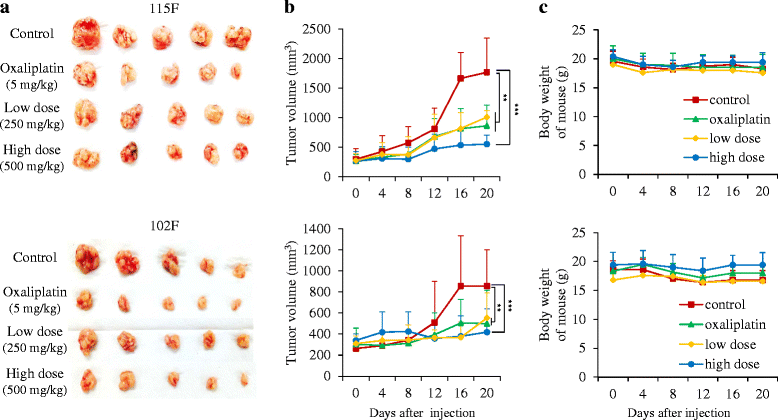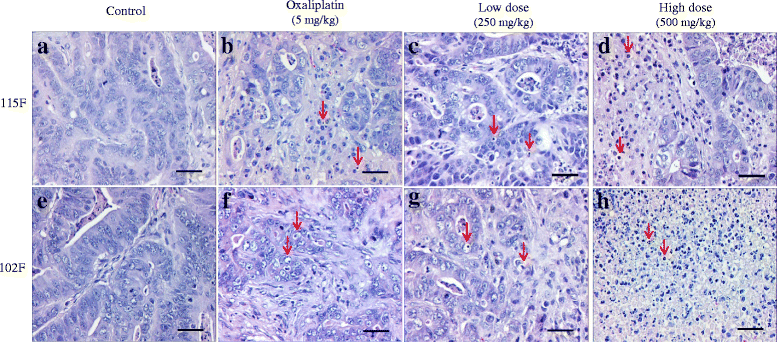Evaluation of anti-tumorigenic activity of BP3B against colon cancer with patient-derived tumor xenograft model
- PMID: 27863496
- PMCID: PMC5116142
- DOI: 10.1186/s12906-016-1447-8
Evaluation of anti-tumorigenic activity of BP3B against colon cancer with patient-derived tumor xenograft model
Abstract
Background: KIOM-CRC#BP3B (BP3B) is a novel herbal prescription that is composed of three plant extracts. Our preliminary study identified that BP3B exhibited potent anti-proliferative activity against various types of cancer cell lines in vitro. Because the in vivo anti-tumor effect of BP3B is not evaluated before clinical trial, we want to test it using patient's samples.
Methods: To confirm the in vivo anti-cancer effect of BP3B, we used genetically characterized patient-derived colon tumor xenograft (PDTX) mouse model. Anti-cancer activity was evaluated with apoptosis, proliferation, angiogenesis and histological analysis.
Results: Oral administration of BP3B significantly inhibited the tumor growth in two PDTX models. Furthermore, TUNEL assay showed that BP3B induced apoptosis of tumor tissues, which was associated with degradation of PARP and Caspase 8 and activation of Caspase 3. We also observed that BP3B inhibited cancer cell proliferation by down-regulation of Cyclin D1 and induction of p27 proteins. Inhibition of angiogenesis in BP3B-treated group was observed with immunofluorescence staining using CD31 and Tie-2 antibodies.
Conclusion: These findings indicated that BP3B has a strong growth-inhibitory activity against colon cancer in in vivo model and will be a good therapeutic candidate for treatment of refractory colon cancer.
Keywords: BP3B; Colon cancer; Medicinal plant; Patient-derived tumor xenograft.
Figures





Similar articles
-
A new herbal formula BP10A exerted an antitumor effect and enhanced anticancer effect of irinotecan and oxaliplatin in the colon cancer PDTX model.Biomed Pharmacother. 2019 Aug;116:108987. doi: 10.1016/j.biopha.2019.108987. Epub 2019 May 18. Biomed Pharmacother. 2019. PMID: 31112870
-
Antitumor activity of melinjo (Gnetum gnemon L.) seed extract in human and murine tumor models in vitro and in a colon-26 tumor-bearing mouse model in vivo.Cancer Med. 2015 Nov;4(11):1767-80. doi: 10.1002/cam4.520. Epub 2015 Sep 26. Cancer Med. 2015. PMID: 26408414 Free PMC article.
-
Voreloxin, formerly SNS-595, has potent activity against a broad panel of cancer cell lines and in vivo tumor models.Cancer Chemother Pharmacol. 2009 Jun;64(1):53-65. doi: 10.1007/s00280-008-0850-3. Epub 2008 Oct 19. Cancer Chemother Pharmacol. 2009. PMID: 18931998
-
Broussoflavonol F exhibited anti-proliferative and anti-angiogenesis effects in colon cancer via modulation of the HER2-RAS-MEK-ERK pathway.Phytomedicine. 2024 Dec;135:156243. doi: 10.1016/j.phymed.2024.156243. Epub 2024 Nov 9. Phytomedicine. 2024. PMID: 39547096
-
[Advances in Patient Derived Tumor Xenograft (PDTX) Model from Lung Cancer].Zhongguo Fei Ai Za Zhi. 2017 Oct 20;20(10):715-719. doi: 10.3779/j.issn.1009-3419.2017.10.09. Zhongguo Fei Ai Za Zhi. 2017. PMID: 29061220 Free PMC article. Review. Chinese.
Cited by
-
PDXliver: a database of liver cancer patient derived xenograft mouse models.BMC Cancer. 2018 May 9;18(1):550. doi: 10.1186/s12885-018-4459-6. BMC Cancer. 2018. PMID: 29743053 Free PMC article.
-
Single-arm, open-label, dose-escalation phase I study to evaluate the safety of a herbal medicine SH003 in patients with solid cancer: a study protocol.BMJ Open. 2018 Aug 5;8(8):e019502. doi: 10.1136/bmjopen-2017-019502. BMJ Open. 2018. PMID: 30082340 Free PMC article.
-
Hsp90β promoted endothelial cell-dependent tumor angiogenesis in hepatocellular carcinoma.Mol Cancer. 2017 Mar 31;16(1):72. doi: 10.1186/s12943-017-0640-9. Mol Cancer. 2017. PMID: 28359326 Free PMC article.
-
Systematic Review of Patient-Derived Xenograft Models for Preclinical Studies of Anti-Cancer Drugs in Solid Tumors.Cells. 2019 May 6;8(5):418. doi: 10.3390/cells8050418. Cells. 2019. PMID: 31064068 Free PMC article.
-
Improved drug-screening tests of candidate anti-cancer drugs in patient-derived xenografts through use of numerous measures of tumor growth determined in multiple independent laboratories.PLoS One. 2025 Jun 18;20(6):e0324141. doi: 10.1371/journal.pone.0324141. eCollection 2025. PLoS One. 2025. PMID: 40531816 Free PMC article.
References
-
- Saltz LB, Cox JV, Blanke C, Rosen LS, Fehrenbacher L, Moore MJ, Maroun JA, Ackland SP, Locker PK, Pirotta N, Elfring GL, Miller LL. Irinotecan plus fluorouracil and leucovorin for metastatic colorectal cancer. Irinotecan Study Group. N Engl J Med. 2000;343:905–14. doi: 10.1056/NEJM200009283431302. - DOI - PubMed
-
- Douillard J, Cunningham D, Roth A, Navarro M, James R, Karasek P, Jandik P, Iveson T, Carmichael J, Alakl M. Irinotecan combined with fluorouracil compared with fluorouracil alone as first-line treatment for metastatic colorectal cancer: a multicentre randomised trial. Lancet. 2000;355:1041–7. doi: 10.1016/S0140-6736(00)02034-1. - DOI - PubMed
-
- Knight R, Miller L, Pirotta N, Elfring G, Locker P, Saltz L. First-line irinotecan (C), fluorouracil (F), leucovorin (L) especially improves survival (OS) in metastatic colorectal cancer (MCRC) patients (PT) with favorable prognostic indicators. Proc Am Soc Clin Oncol. 2000;19:991a.
MeSH terms
Substances
LinkOut - more resources
Full Text Sources
Other Literature Sources
Research Materials
Miscellaneous

